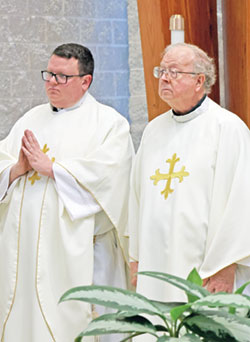In 50 years, Father Joseph Rautenberg has served as ethicist, parish priest

Father Joseph Rautenberg, right, concelebrates a Sept. 30 Mass at St. Mark the Evangelist Church in Indianapolis to celebrate
the 75th anniversary of the founding of the faith community. A son of the parish, Father Rautenberg was ordained a priest in 1973. Concelebrating with him is Father James Brockmeier. (Submitted photo)
By Sean Gallagher
There’s no doubt that modesty is a prime feature of the personality of Father Joseph Rautenberg, a retired archdiocesan priest.
When answering questions about the 50th anniversary of his ordination as a priest, he asked with a smile that any article about him be “as subdued and as boring as I really am.”
Whether his five decades of priestly life and ministry are boring or flashy is a question that individuals will have to answer on their own. Since his 1973 ordination, Father Rautenberg has brought together—with much pastoral skill and a pastor’s heart—the Church’s centuries-long tradition of seeking to integrate academic research with pastoral ministry.
A son of St. Mark the Evangelist Parish on Indianapolis’ south side, Father Rautenberg began discerning a possible priestly vocation at a young age. A graduate of the Latin School of Indianapolis, the archdiocese’s former high school seminary, he went on to receive priestly formation at the former Saint Meinrad College and Saint Meinrad Seminary and School of Theology in St. Meinrad.
While in the southern Indiana seminary, Father Rautenberg developed an interest in the interplay of science and faith.
This led him to do graduate work in ethics in the philosophy department at Georgetown University in Washington in the 1980s.
“It was something that I wanted and something that [archdiocesan leaders] thought would make sense with the health care systems here and issues coming up,” Father Rautenberg said.
Before doing full-time graduate work at Georgetown, Father Rautenberg did parish ministry for seven years at two Indianapolis parishes. And while in Washington, he assisted at a parish there.
“It was a very rich experience,” he said of his time in the nation’s capital. “One of the things I learned to appreciate was not only that moral theology is based in a vision of humanity, but also simply the importance of critical thinking. You need both.”
After Father Rautenberg earned a doctorate in ethics and returned to minister in the archdiocese, he always assisted in parishes, even when his full-time ministry was as an ethicist at Ascension St. Vincent Hospital in Indianapolis.
The archdiocesan parishes in which he ministered range geographically from as far south as French Lick and Paoli to as far east as Cambridge City. He also served in parishes in the Batesville Deanery.
“I didn’t want to just be an ivory tower academician,” Father Rautenberg said. “Contact with people, their lives and problems kept things real for me.
“How do you make morality and moral principles intellectually respectable and able to stand their ground with scientific rigor, but, at the same time, not lose sight of human values and people?”
Beginning in 2005, Father Rautenberg focused on parish ministry full time. He served as administrator and then pastor of St. Elizabeth of Hungary Parish in Cambridge City in the Connersville Deanery from 2005-16.
Although his experiences as a priest have ranged widely from academic work at a top-flight university to ethics consulting at a Catholic hospital to serving in parishes in cities, small towns and rural areas, Father Rautenberg sees them all tied together.
“I don’t see a divorce between ministry in medical ethics and pastoral ministry,” he said. “If you’re with a family trying to make decisions about a patient or if you’re in a parish trying to preach to people, you want to talk with both of them about life, about what makes sense in life and how you have hope.”
Likewise, Father Rautenberg valued his experiences in the relationships he built up with both scholars of philosophy and with farmers in rural Indiana. Regarding the latter, Father Rautenberg said that “anybody who thinks that farmers are stupid don’t know any farmers.”
This feeling at home wherever he has been called to minister he sees expressed well in a quote from the ancient Roman playwright Terence that Father Rautenberg learned while a seminarian at Saint Meinrad: “I am a man. Nothing human is foreign to me.”
In recent years, physical ailments have limited Father Rautenberg’s ministry. Although he continues to serve as a consultant on ethics and bioethics, he retired from parish ministry in 2018. Still, he finds great fulfillment in being an archdiocesan priest now for 50 years.
“I feel that I’ve been able to help people find peace and hope, but also to do that in a context that could stand with the best of the thinking, science and philosophy,” Father Rautenberg said. “I didn’t need to cut any pieces of life apart to make it meaningful.”
(For more information on a vocation to the priesthood in the Archdiocese of Indianapolis, visit www.HearGodsCall.com.) †
